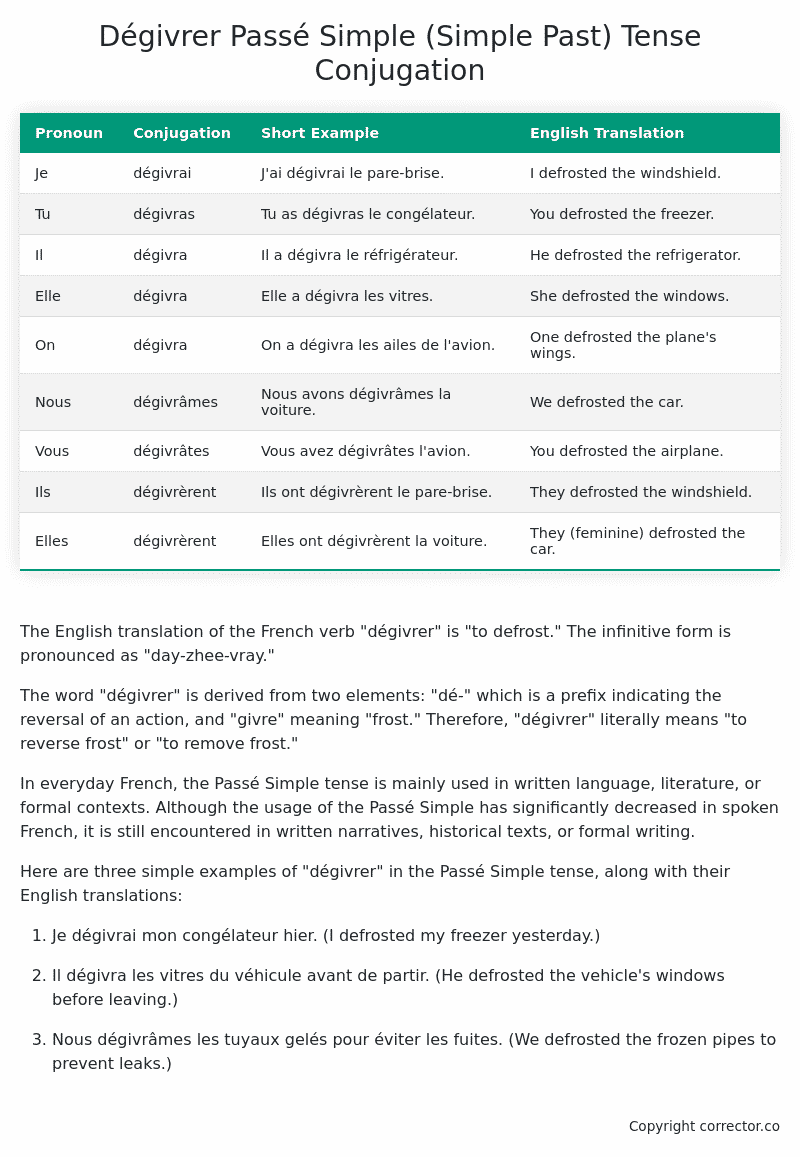Passé Simple (Simple Past) Tense Conjugation of the French Verb dégivrer
Introduction to the verb dégivrer
The English translation of the French verb “dégivrer” is “to defrost.” The infinitive form is pronounced as “day-zhee-vray.”
The word “dégivrer” is derived from two elements: “dé-” which is a prefix indicating the reversal of an action, and “givre” meaning “frost.” Therefore, “dégivrer” literally means “to reverse frost” or “to remove frost.”
In everyday French, the Passé Simple tense is mainly used in written language, literature, or formal contexts. Although the usage of the Passé Simple has significantly decreased in spoken French, it is still encountered in written narratives, historical texts, or formal writing.
Here are three simple examples of “dégivrer” in the Passé Simple tense, along with their English translations:
-
Je dégivrai mon congélateur hier.
(I defrosted my freezer yesterday.) -
Il dégivra les vitres du véhicule avant de partir.
(He defrosted the vehicle’s windows before leaving.) -
Nous dégivrâmes les tuyaux gelés pour éviter les fuites.
(We defrosted the frozen pipes to prevent leaks.)
Table of the Passé Simple (Simple Past) Tense Conjugation of dégivrer
| Pronoun | Conjugation | Short Example | English Translation |
|---|---|---|---|
| Je | dégivrai | J’ai dégivrai le pare-brise. | I defrosted the windshield. |
| Tu | dégivras | Tu as dégivras le congélateur. | You defrosted the freezer. |
| Il | dégivra | Il a dégivra le réfrigérateur. | He defrosted the refrigerator. |
| Elle | dégivra | Elle a dégivra les vitres. | She defrosted the windows. |
| On | dégivra | On a dégivra les ailes de l’avion. | One defrosted the plane’s wings. |
| Nous | dégivrâmes | Nous avons dégivrâmes la voiture. | We defrosted the car. |
| Vous | dégivrâtes | Vous avez dégivrâtes l’avion. | You defrosted the airplane. |
| Ils | dégivrèrent | Ils ont dégivrèrent le pare-brise. | They defrosted the windshield. |
| Elles | dégivrèrent | Elles ont dégivrèrent la voiture. | They (feminine) defrosted the car. |
Other Conjugations for Dégivrer.
Le Present (Present Tense) Conjugation of the French Verb dégivrer
Imparfait (Imperfect) Tense Conjugation of the French Verb dégivrer
Passé Simple (Simple Past) Tense Conjugation of the French Verb dégivrer (You’re reading it right now!)
Passé Composé (Present Perfect) Tense Conjugation of the French Verb dégivrer
Futur Simple (Simple Future) Tense Conjugation of the French Verb dégivrer
Futur Proche (Near Future) Tense Conjugation of the French Verb dégivrer
Plus-que-parfait (Pluperfect) Tense Conjugation of the French Verb dégivrer
Passé Antérieur (Past Anterior) Tense Conjugation of the French Verb dégivrer
Futur Antérieur (Future Anterior) Tense Conjugation of the French Verb dégivrer
Subjonctif Présent (Subjunctive Present) Tense Conjugation of the French Verb dégivrer
Subjonctif Passé (Subjunctive Past) Tense Conjugation of the French Verb dégivrer
Subjonctif Imparfait (Subjunctive Imperfect) Tense Conjugation of the French Verb dégivrer
Subjonctif Plus-que-parfait (Subjunctive Pluperfect) Tense Conjugation of the French Verb dégivrer
Conditionnel Présent (Conditional Present) Tense Conjugation of the French Verb dégivrer
Conditionnel Passé (Conditional Past) Tense Conjugation of the French Verb dégivrer
Conditionnel Passé II (Conditional Past II) Tense Conjugation of the French Verb dégivrer
L’impératif Présent (Imperative Present) Tense Conjugation of the French Verb dégivrer
L’impératif Passé (Imperative Past) Tense Conjugation of the French Verb dégivrer
L’infinitif Présent (Infinitive Present) Tense Conjugation of the French Verb dégivrer
L’infinitif Passé (Infinitive Past) Tense Conjugation of the French Verb dégivrer
Le Participe Présent (Present Participle) Tense Conjugation of the French Verb dégivrer
Le Participe Passé (Past Participle) Tense Conjugation of the French Verb dégivrer
Struggling with French verbs or the language in general? Why not use our free French Grammar Checker – no registration required!
Get a FREE Download Study Sheet of this Conjugation 🔥
Simply right click the image below, click “save image” and get your free reference for the dégivrer Passé Simple tense conjugation!

Dégivrer – About the French Passé Simple (Simple Past) Tense
Formation
Usage
Narration
Historical Context
Interactions with other tenses
Passé Composé
Imparfait
Conditional and Subjunctive
Summary
I hope you enjoyed this article on the verb dégivrer. Still in a learning mood? Check out another TOTALLY random French verb conjugation!


